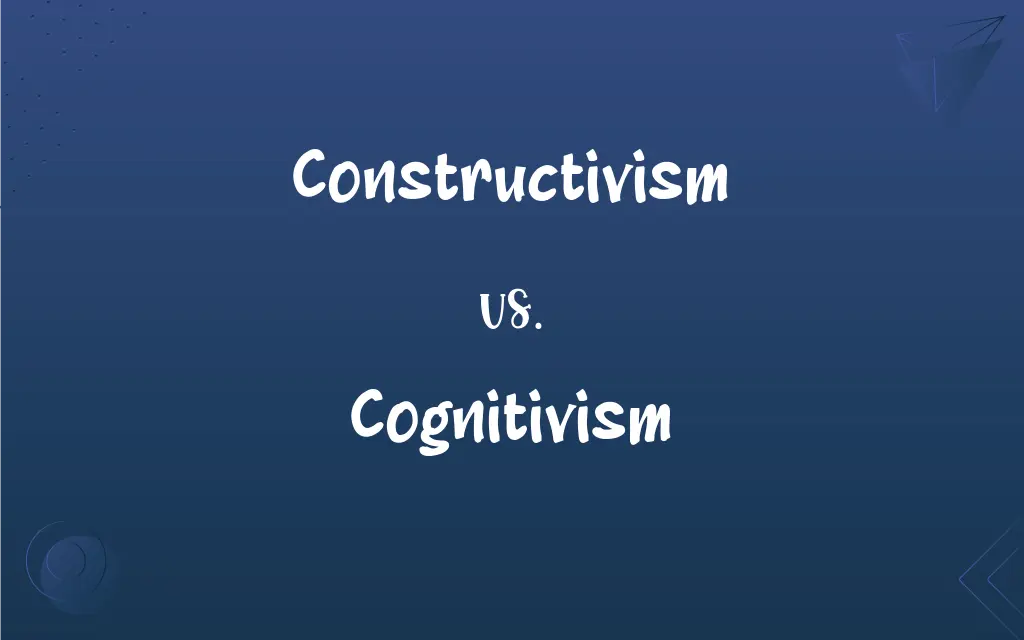Constructivism vs. Cognitivism: What's the Difference?
Edited by Aimie Carlson || By Harlon Moss || Published on December 21, 2023
Constructivism emphasizes learning as a process of actively constructing knowledge, while cognitivism focuses on the mental processes underlying learning.

Key Differences
Constructivism posits that learners actively construct their own understanding and knowledge of the world, through experiencing things and reflecting on those experiences. Conversely, cognitivism concentrates on the inner mental activities – opening the "black box" of the human mind – necessary for intelligent thought and problem-solving.
In constructivism, learning is seen as a highly personal journey where context and experience play crucial roles. This contrasts with cognitivism, which views learning as a process of acquiring, storing, and retrieving information, emphasizing the role of the brain as an information processor.
Constructivism suggests that learners create their own subjective representations of objective reality, meaning knowledge is subjective. Cognitivism, however, treats knowledge as something that can be objectively measured and focuses on the cognitive processes that lead to knowledge acquisition.
Constructivism advocates for learning environments where students play an active role in their learning, while cognitivism supports the use of strategies that guide students to process information effectively, such as memory aids or analogies.
Constructivist learning is inherently exploratory, with learners building their knowledge through exploration and experimentation. Cognitivism, in contrast, emphasizes structured teaching methods, where the brain’s cognitive processes are optimized for learning efficiency.
ADVERTISEMENT
Comparison Chart
Learning Theory
Learners construct knowledge through experience.
Focuses on the mental processes of learning.
Role of Experience
Central, as learning is seen as a personal journey.
Less emphasized; focuses on mental processing.
Nature of Knowledge
Subjective, built by the learner.
More objective, based on cognitive processes.
Teaching Methods
Encourages exploration and experimentation.
Emphasizes structured, cognitive strategies.
Focus
On the process of learning.
On how the brain processes and stores information.
ADVERTISEMENT
Constructivism and Cognitivism Definitions
Constructivism
Learning as an active, constructive process.
In constructivism, a student learns physics by performing experiments, not just by reading about them.
Cognitivism
Focuses on the workings of the human brain.
Cognitivism explains memory recall as a mental process, akin to retrieving files in a computer.
Constructivism
Knowledge is constructed, not transmitted.
Constructivism emphasizes that understanding history involves analyzing events, not memorizing dates.
Cognitivism
Emphasizes internal cognitive structures.
Cognitivism analyzes how language structures are internalized by learners.
Constructivism
Learning is contextual and personal.
Constructivism suggests that learning a language is more effective through cultural immersion.
Cognitivism
Studies how thinking and memory work in learning.
Cognitivism explores the role of working memory in problem-solving tasks.
Constructivism
Emphasizes learner’s role in their own education.
Constructivism involves students in project-based learning for a deeper understanding.
Cognitivism
Concerned with how information is processed.
Cognitivism studies how students encode and store mathematical formulas.
Constructivism
Based on the principle that reality is constructed by the learner.
Constructivism views learning art as creating personal interpretations of art, not just learning techniques.
Cognitivism
Views learning as a change in mental representations.
Cognitivism interprets understanding scientific concepts as altering cognitive frameworks.
Constructivism
A movement in modern art originating in Moscow in 1920 and characterized by the use of industrial materials such as glass, sheet metal, and plastic to create nonrepresentational, often geometric objects.
Cognitivism
(philosophy) The view that ethical sentences express propositions and are therefore capable of being true or false.
Constructivism
(arts) A Russian movement in modern art characterized by the creation of nonrepresentational geometric objects using industrial materials.
Cognitivism
(arts) The view that a work of art is valuable if it contributes to knowledge.
Constructivism
(mathematics) A philosophy that asserts the need to construct a mathematical object to prove it exists.
Cognitivism
(psychology) The view that mental function can be understood as the internal manipulation of symbols according to a set of rules.
Constructivism
A psychological epistemology which argues that humans generate knowledge and meaning from their experiences.
Constructivism
An abstractionist artistic movement in Russia after World War I; industrial materials were used to construct nonrepresentational objects
FAQs
What is constructivism in learning?
A theory where learners actively construct their own understanding.
What does cognitivism focus on?
It focuses on the mental processes involved in learning.
Can constructivism be applied in all learning areas?
Yes, it can be, especially where exploration and reflection are beneficial.
Is constructivism effective for all students?
It may vary; some students thrive, while others may need more structure.
Are constructivist classrooms structured?
They're often less structured, focusing on learner autonomy.
Can constructivism be blended with other learning theories?
Yes, it's often combined with other approaches for a more holistic education.
How do constructivist teachers facilitate learning?
They create environments that encourage exploration and knowledge construction.
How important is feedback in cognitivism?
Very, as it helps in adjusting cognitive processes.
What role do cognitive skills play in cognitivism?
They are central to processing and understanding information.
How does constructivism differ from traditional education models?
It emphasizes active participation and discovery, unlike passive learning.
What role does memory play in cognitivism?
Memory is crucial for processing and storing information.
Does cognitivism ignore the emotional aspect of learning?
It primarily focuses on mental processes, though emotions can be considered as influencing factors.
How does constructivism impact motivation?
It can increase motivation by making learning more relevant and engaging.
Does cognitivism support collaborative learning?
It can, especially if it aids cognitive processes like discussion and reflection.
How does cognitivism view intelligence?
As a product of efficient cognitive processing and structures.
Can cognitivism help in curriculum design?
Absolutely, by ensuring the content aligns with cognitive learning principles.
What types of learning strategies does cognitivism suggest?
Strategies like mnemonics, rehearsal, and conceptual mapping.
What is a key benefit of constructivism?
It promotes deeper understanding through active engagement.
How does cognitivism address learning disabilities?
By understanding and addressing specific cognitive challenges.
Is constructivism suitable for online learning?
Yes, with appropriately designed interactive and exploratory activities.
About Author
Written by
Harlon MossHarlon is a seasoned quality moderator and accomplished content writer for Difference Wiki. An alumnus of the prestigious University of California, he earned his degree in Computer Science. Leveraging his academic background, Harlon brings a meticulous and informed perspective to his work, ensuring content accuracy and excellence.
Edited by
Aimie CarlsonAimie Carlson, holding a master's degree in English literature, is a fervent English language enthusiast. She lends her writing talents to Difference Wiki, a prominent website that specializes in comparisons, offering readers insightful analyses that both captivate and inform.







































































